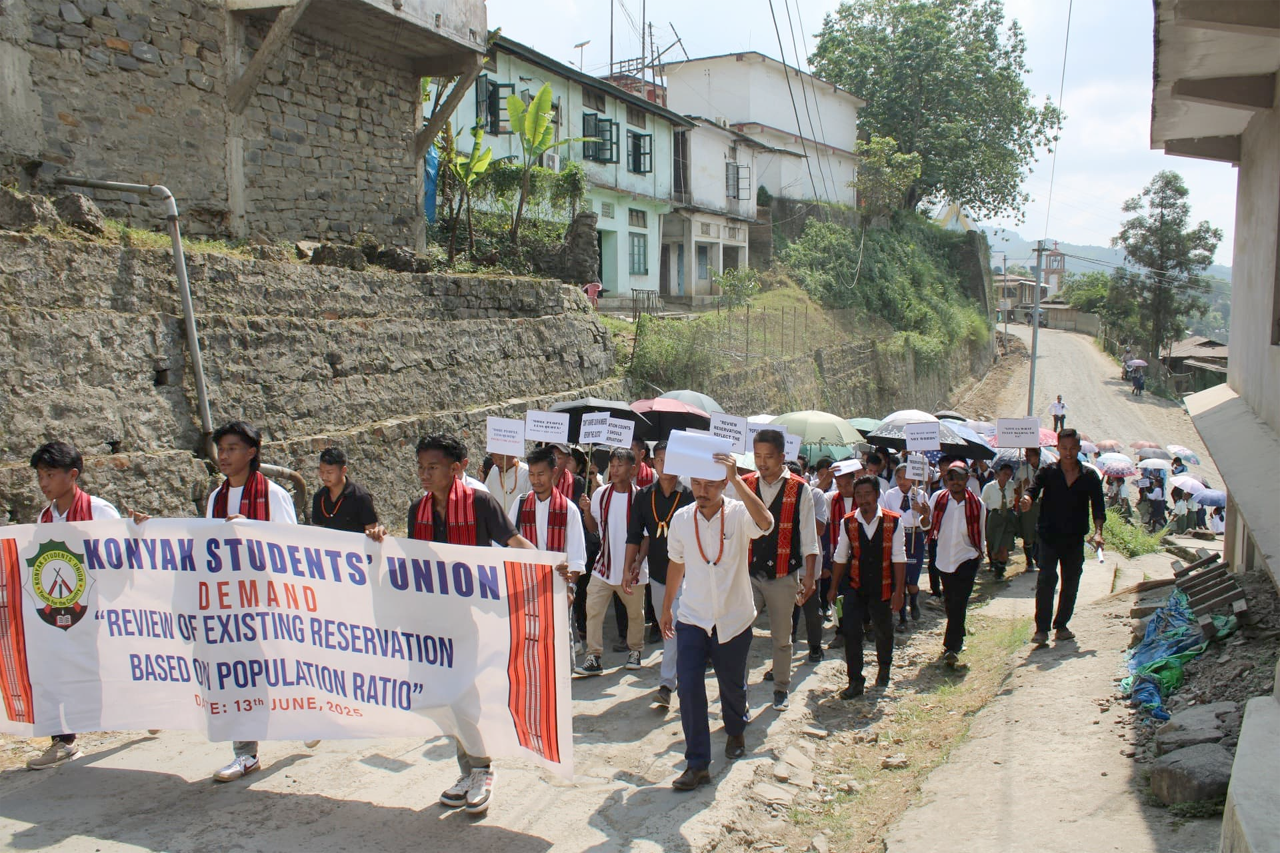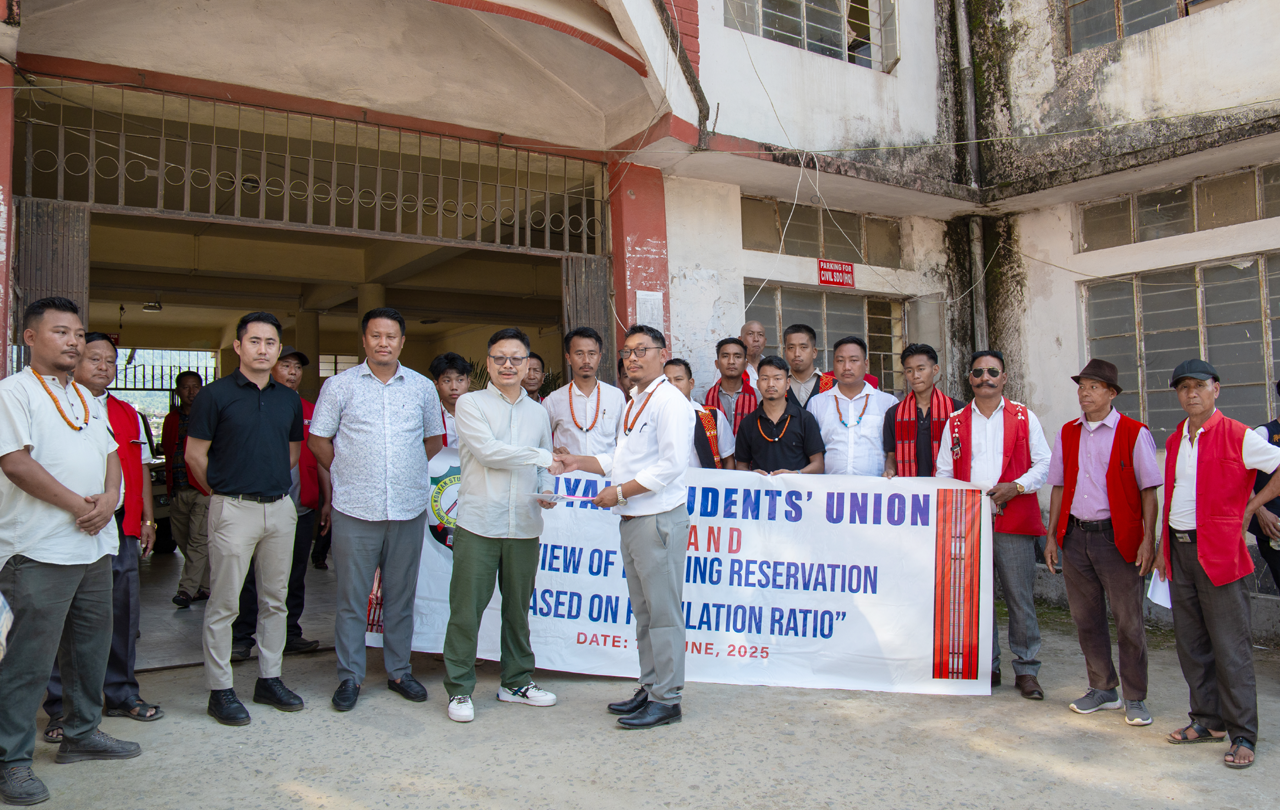The Konyak Students’ Union has sought an immediate review and reform of the state’s job reservation policy to ensure equitable justice based on population ratio.
In a strongly-worded representation addressed to the Chief Minister of Nagaland through the Deputy Commissioner of Mon, the Konyak Students’ Union (KSU) has sought an immediate review and reform of the state’s job reservation policy to ensure equitable justice based on population ratio.
Stating that reservation is an inherent right and not a concession, the Union has called upon the State Government to undertake a comprehensive and urgent review of Nagaland’s Backward Tribes Job Reservation Policy to ensure it reflects the actual population distribution and delivers true equity.
The representation, signed by KSU President Temwang and General Secretary A Pangnan urged the Chief Minister to demonstrate strong political will by introducing a special provision through a fast-tracked cabinet decision, stating that the matter cannot afford to wait for the release of the 2021 Census data, and that the aspirations of an entire community hinge on timely action.
Recounting the historical background, the Konyak Students’ Union pointed out that since the formation of Nagaland as a state in 1963, the Konyak tribe has remained one of the most socio-economically disadvantaged communities.
The Union highlighted that the job reservation policy first introduced in 1977 granted 25% reservation to seven backward tribes. In 1979, the policy was revised to include Chakhesang and Zeliang tribes with 4% each, raising the total reservation to 33%, but failed to address the needs of larger tribes like the Konyak.
Another revision in 2008 restructured the reservation to accommodate Chakhesang, Pochury, and Zeliang tribes with 8% but left the total at 33%. The 2011 enhancement further added 2% each for the Pochury tribe and Sumis of Kiphire district, raising the total to 37%, yet the Konyak community continued to be sidelined, it further stated.

The KSU stated that with a population exceeding 2.5 lakh—approximately 12.65% of Nagaland’s tribal demographic—the Konyak tribe stands as one of the largest Naga tribes. Yet, the current job reservation policy as per Notification No. RCBT-5/87(Pt-11) dated 4th September 2015, continues to deny the Konyak people their rightful share, trapped in a system that undermines population size, struggles and aspirations.
Describing the situation as a grave injustice, the Union said this is not merely a policy oversight but a betrayal of fairness, calling for urgent rectification.
Download Nagaland Tribune app on Google Play

The representation demanded immediate review and reconstitution of the existing job reservation policy, and adoption of a population-based reservation system that allocates job quotas proportionate to population, ensuring justice and equity for all.
The KSU asserted that the existing uniform reservation quotas have not adequately reflected the demographic realities of the Konyak tribe despite being one of the most populous communities. A population-based reservation system, it said, is the only path to true fairness and justice to true fairness, ensuring that every backward tribe’s representation in state employment reflects its demographic weight. “Anything less undermines the principles of justice,” KSU stated.
According to the Union, while Nagaland has approximately 1.23 lakh government servants with an employment ration of 1: 15, yet despite constituting 12.65% of the state’s tribal population, the Konyak community holds only 6% of government jobs, resulting in an employment ratio of 1:33, as compared to the state average of 1:15. “This glaring disparity is a stark reminder of systemic neglect for many years despite of the reservation policy in place since 1977,” it claimed.
Citing data from the 2011 Census, the Union noted that Mon district, the heartland of the Konyak tribe, has the lowest literacy rate in Nagaland at 56.99%, which is lower than the national average. The educational disadvantage, it said, continues to hinder the socio-economic progress of the community.
Further, the KSU pointed to an alarming rate of educated unemployment among the Konyaks, despite rising numbers of graduates and degree holders. “This crisis is not just an economic concern but a social time bomb, leading to rising frustration, migration, and vulnerability to negative influences,” it said, adding, “The lack of avenues for skilled employment not only wastes valuable human potential but also stalls the overall progress of the Konyak tribe”.
The representation also highlighted that the lack of government job opportunities and other avenues for earning livelihood has driven countless educated Konyak youth toward anti-social activities, negative migration, insurgent groups, lured by desperation and disillusionment. It warned that the growing unrest threatens not only the community but the stability of Nagaland as a whole.
Quoting the Nagaland State Human Development Report (2016), the KSU emphasized that Mon district is the most backward with lowest Human Development Index at 0.5, with the poorest indicators in education, health, poverty, sex ratio, and per capita income etc.
It pointed out that Mon district has the highest percentage of population living in the rural area standing at 86.4% according to 2011 census indicating that the population of the District has the least access to all the basic amenities of life.
Describing the present situation as a critical juncture, the Konyak Students’ Union made an earnest plea to the State Government to act with urgency and resolve. It stated that a population-based reservation policy is not merely a reform, but a moral and social necessity that will uplift the Konyak people and strengthen Nagaland as a whole.
Placing its trust in the Chief Minister’s commitment to equity, the KSU expressed hope that the longstanding grievance of the community will be transformed into a beacon of hope through bold and justifiable action.

